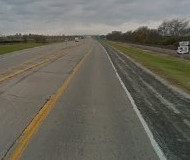Article from: www.thenewspaper.com/news/50/5055.asp
10/4/2016
Illinois Court Criminalizes Failure To Unnecessarily Signal
Second highest court in Illinois decides motorists can be pulled over for failure to signal while traveling straight ahead.
 Is it necessary to use one's blinker when driving straight ahead in a single lane that splits into two lanes? The Illinois Appellate Court considered the question last month and decided that police could pull over motorists at any time if they failed to signal in such circumstances. This was the alleged offense that snagged Shawn Barbee and Byron D. Theus, who were stopped on March 28, 2011. Barbee's gold Chevrolet Malibu happened to be headed down Taylorsville Road in Decatur near the overpass for US51 where the single northbound lane splits into two lanes.
Is it necessary to use one's blinker when driving straight ahead in a single lane that splits into two lanes? The Illinois Appellate Court considered the question last month and decided that police could pull over motorists at any time if they failed to signal in such circumstances. This was the alleged offense that snagged Shawn Barbee and Byron D. Theus, who were stopped on March 28, 2011. Barbee's gold Chevrolet Malibu happened to be headed down Taylorsville Road in Decatur near the overpass for US51 where the single northbound lane splits into two lanes.
"I just continued straight into the lane that I was in," Barbee testified.
Macon County Sheriff's Detective Chad Larner claims he witnessed the Malibu's failure to signal, so he radioed ahead to a deputy to have the vehicle pulled over for an "improper lane change." During the traffic stop that followed, a drug dog was called in and cocaine was found. Theus, the passenger that night, argued the evidence against him should be suppressed because the initial traffic stop was illegal. Macon County Circuit Court Judge Timothy J. Steadman agreed after reviewing video and photographs of the road in question.
"The law recognizes that deviations in the movement of a vehicle may be attributable to road conditions," Judge Steadman ruled. "The vehicle was not turned. There was no movement made from one marked lane to another. There is no evidence suggesting that movement of the vehicle was made without reasonable safety. Under these unique circumstances the court finds that there was no duty to signal and therefore no reasonable grounds to believe that [Illinois Code Section] 11-804 had been violated."
Prosecutors would not let this stand. They insisted that police should have the right to pull over anyone who fails to use a turn signal when one lane becomes two lanes, even if the motorist makes no turn or lane change. The three-judge appellate panel sided with the prosecution, citing the US Supreme Court's 2014 Heien decision (view case), which allows traffic stops that are based on an incorrect legal interpretations as long as the police officer can assert a "reasonable" justification. Here, the three-judge panel left it an open question whether a signal would actually be required.
"The plain text of the statute requires a signal when changing lanes," Judge John W. Turner wrote for the Appellate Court. "There is no ambiguity in that requirement. However, it does not address whether it applies to lane divisions and mergers, and thus an ambiguity arises when applying the law to the spot of Route 48 where Barbee is alleged to have committed the infraction. Here, one lane became two lanes, requiring Barbee to pick one. He could not continue driving straight; otherwise he would be straddling the dotted white line separating the two lanes. Barbee testified he moved into the left lane. Thus, the solid white line would no longer have been on his right. Instead, the dotted white line delineating the two new lanes would be.... The result is the same whether Larner was right or wrong about the law."
The court reinstated the charges against the Malibu occupants. A copy of the ruling is available in a 50k PDF file at the source link below.
Source: Illinois v. Theus (Illinois Appellate Court, 9/22/2016)
Permanent Link for this item
Return to Front Page
 Is it necessary to use one's blinker when driving straight ahead in a single lane that splits into two lanes? The Illinois Appellate Court considered the question last month and decided that police could pull over motorists at any time if they failed to signal in such circumstances. This was the alleged offense that snagged Shawn Barbee and Byron D. Theus, who were stopped on March 28, 2011. Barbee's gold Chevrolet Malibu happened to be headed down Taylorsville Road in Decatur near the overpass for US51 where the single northbound lane splits into two lanes.
Is it necessary to use one's blinker when driving straight ahead in a single lane that splits into two lanes? The Illinois Appellate Court considered the question last month and decided that police could pull over motorists at any time if they failed to signal in such circumstances. This was the alleged offense that snagged Shawn Barbee and Byron D. Theus, who were stopped on March 28, 2011. Barbee's gold Chevrolet Malibu happened to be headed down Taylorsville Road in Decatur near the overpass for US51 where the single northbound lane splits into two lanes.